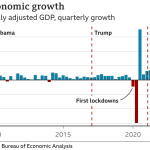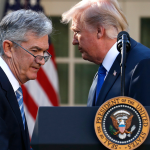Rick Scott tariffs have become a significant point of discussion as the Republican senator defends the Trump administration’s trade strategy aimed at fostering a more competitive U.S. economy. Scott argues that these tariffs are essential for leveling the playing field, allowing American workers to sell more products without facing excessive foreign barriers. By imposing these tariffs, particularly on nations like China, Scott believes that the U.S. can push for fairer trade practices and ultimately bolster the American workforce. This aggressive tariff policy has garnered both support and criticism, with implications that reverberate through national trade policies and the economic landscape. As Scott emphasizes the need for action, the future of the U.S. economy hangs in the balance, focused sharply on how the tariff strategy will unfold.
The recent discussions surrounding trade barriers and import duties have spotlighted Senator Rick Scott’s firm stance on tariffs as a means to enhance the U.S. economic landscape. By implementing protective measures against countries like China, Scott aims to fortify American industries and empower workers to thrive in a competitive global market. This approach to trade regulation reflects broader concerns about fair trading practices and the long-term sustainability of American manufacturing. As policymakers navigate the delicate balance of international commerce, Scott’s perspective sheds light on the potential ramifications of a revised trade policy. Ultimately, understanding the dynamics behind these tariffs is crucial for grasping the impact on both domestic growth and the global economy.
Understanding Rick Scott’s Tariff Strategy
Senator Rick Scott’s support for tariffs signifies a robust approach focused on safeguarding American interests in the global marketplace. By backing the Trump administration’s tariff strategy, he aims to revamp the trade dynamics to favor U.S. workers and businesses. Scott argues that these tariffs are essential in countering the long-standing trade imbalances, particularly with nations like China, which he perceives as a primary economic threat to the U.S. economy. He advocates for a more assertive trade policy that seeks to eliminate barriers that disadvantage American producers, thereby enabling them to compete more effectively on a global scale.
In his discussions, Scott has explicitly noted the consequences of not leveraging tariffs, such as potential job losses and stunted growth for American manufacturing. He posits that tariffs serve not just as a protective measure but as a catalyst for renegotiating better trade agreements that can enhance the sales potential of U.S. goods abroad. By advocating for a favorable trade atmosphere, he believes American workers can gain a competitive edge, effectively leveling the playing field in international markets.
The Impact of Tariffs on the U.S. Economy
The implementation of tariffs has stirred considerable debate regarding its impact on the U.S. economy. Proponents like Scott argue that increased tariffs can bolster domestic production and support American workers by narrowing trade deficits and promoting local manufacturing. For instance, the government’s decision to impose a 10 percent tariff across most nations is framed as a strategy to incentivize foreign countries to lower their own tariffs, thereby encouraging a fairer trading environment. This perspective sees tariffs not merely as economic barriers but as tools for economic growth and worker protection.
Conversely, many economists contend that Scott’s tariff strategy could adversely affect the U.S. economy, leading to increased prices for consumers and potential retaliatory measures from other countries. Concerns have been raised regarding whether tariffs might induce inflationary pressures, which could dampen consumer spending and economic confidence. This ongoing tension between protectionist measures and their potential repercussions illustrates the complex nature of implementing trade policies that aim to benefit American workers while managing broader economic stability.
Rick Scott and the U.S.-China Trade Relations
Rick Scott’s criticism of China highlights the geopolitical dimensions of trade relations and economic security. By asserting a strong anti-China stance, Scott emphasizes the need for the U.S. to adopt a tough approach to trade, particularly as economic competition intensifies. According to Scott, the substantial tariffs placed on Chinese imports are designed not just to rectify trade imbalances but also to send a firm message regarding the U.S. position on unfair trade practices. The current 145 percent tariff on Chinese goods illustrates the extent to which trade policy is weaponized in the context of national security.
Moreover, by insisting on minimal trade with China, Scott underscores his belief that economic disengagement could prevent larger conflicts. His assertion that the only way to avoid war is by weakening China’s economy reveals a strategic mindset that intertwines economic policy with military considerations. Such a stance not only reflects the urgency of addressing trade policy but also signals a potential shift in how the U.S. perceives its economic adversaries.
Tariffs and Their Influence on American Workers
Rick Scott’s argument that tariffs will ultimately benefit American workers stems from his belief that protecting domestic industries is vital for job preservation. By raising tariffs on foreign products, Scott suggests that American-made goods become more competitive, allowing jobs in manufacturing and production to flourish. This focus on enhancing the livelihoods of American workers aligns with broader protectionist sentiments prevalent in segments of U.S. economic policy that advocate for domestic priorities over global considerations.
However, the reality of this approach has sparked debate regarding the potential fallout on consumers and industries heavily reliant on imported goods. Critics argue that while tariffs may offer short-term relief for certain sectors, they can inadvertently lead to higher consumer prices and decreased choice in the marketplace. Thus, the challenge lies in balancing protectionist strategies with the need for an open and competitive economy that can sustain growth while genuinely benefiting American workers.
Negotiating Trade Agreements vs. Imposing Tariffs
The conversation surrounding trade often juxtaposes the effectiveness of negotiating agreements against the use of tariffs as a pressure tactic. Senator Rick Scott’s fervent support for tariffs leads to questions about whether such measures could have been replaced with diplomatic negotiations. Indeed, some experts, including Jason Furman, argue that well-structured trade agreements could yield better outcomes for U.S. businesses and workers without risking economic instability caused by tariffs.
Moreover, this debate emphasizes the need for a multifaceted trade policy that not only reacts to existing barriers but proactively seeks to foster collaboration with international partners. While Scott’s assertions highlight an urgent necessity to reconsider trade dynamics, they also call attention to the potential of dialogue and negotiation in crafting sustainable trade relationships that could benefit all stakeholders involved.
The Future of U.S. Trade Policy Under Rick Scott
Looking ahead, the future of U.S. trade policy may heavily reflect the perspectives of influential figures like Rick Scott. His advocacy for tariffs represents a significant shift in how trade could be approached, one that seeks to prioritize American workers and industries above all else. Scott’s perspectives signify a growing trend among U.S. policymakers inclined towards protectionist approaches, highlighting a potential shift that could redefine the nation’s trade landscape in the coming years.
As America navigates complexities in international relations, particularly with rivals like China, the direction taken by leaders like Scott will shape future trade discussions. Balancing the necessity for protecting domestic interests with the pragmatic need for cooperation may well be the litmus test of future U.S. trade policy. The ongoing discourse around tariffs, trade agreements, and the economic engagement with global partners underscores an evolving narrative on how America positions itself in the world economy.
The Role of Tariffs in Economic Nationalism
Tariffs are often viewed as a manifestation of economic nationalism, a philosophy that prioritizes a nation’s economic interests over globalization. Senator Rick Scott’s strong advocacy for tariffs aligns closely with this principle, as he believes that bolstering American industry is paramount to restoring national pride and economic independence. By promoting policies that favor local production and deter foreign competition, Scott’s approach resonates with those who feel that the U.S. has been at a disadvantage in global trade for too long.
This trend towards economic nationalism raises critical questions about the long-term sustainability of such policies. As nations increasingly employ tariffs as tools for protection, the risk of trade wars escalates, potentially leading to unintended consequences that could harm the global economy. Scott’s determination to utilize tariffs as a strategic tool illustrates the ongoing tension between national interests and the interconnectedness of the global marketplace.
Evaluating the Economic Consequences of Tariffs
Assessing the economic consequences of tariffs is essential for determining their viability in supporting American workers and manufacturers. The imposition of significant tariffs can lead to market distortions, where the expected benefits of protecting domestic industries may be overshadowed by rising costs for consumers and increased tensions with trade partners. Critics of Scott’s tariff strategy caution that while certain sectors may benefit in the short run, the broader implications could lead to detrimental effects on the overall economy.
Furthermore, the unpredictability introduced by tariffs can create uncertainty in the market, affecting investment decisions and consumer behavior. As companies adapt to new tariffs and navigate the complexities of international trade, the economic landscape may shift in unforeseen ways. Therefore, the debate continues over whether the short-term gains associated with tariffs justify the potential long-term economic ramifications that could unfold as global trade evolves.
The Intersection of Tariffs and National Debt
Rick Scott’s discussion of tariffs cannot be divorced from the pressing issue of national debt. As he advocates for tariffs as a means to protect American industry and workers, the financial implications of such policies inevitably come into play. With projections indicating that the national debt could rise to approximately $20 trillion in the coming decades, balancing economic protectionism with fiscal responsibility poses a significant challenge for policymakers.
In this context, Scott has pointed out the importance of a balanced budget and reduced spending as necessary complements to tariff implementation. By suggesting that both approaches are key to improving the nation’s fiscal outlook, Scott encourages a holistic view of economic policy where tariffs are part of a larger strategy to enhance financial stability while concurrently protecting American workers.
Frequently Asked Questions
How do Rick Scott tariffs impact the U.S. economy?
Rick Scott tariffs are intended to protect American workers by leveling the playing field against foreign competition, particularly from China. Scott argues that these tariffs will allow U.S. workers to sell more products without facing disadvantages from foreign tariffs. However, opponents caution that such tariffs may lead to economic volatility and inflation, affecting the overall U.S. economy.
What is Rick Scott’s stance on China trade in relation to tariffs?
Senator Rick Scott views China as a major competitor and strongly advocates for tariffs as a strategy to counteract Chinese economic dominance. He believes that without imposing tariffs, trade with China could lead to significant economic and security challenges for the U.S. Scott suggests that reducing trade with China is essential for preventing conflict and supporting American workers.
What tariff strategy does Rick Scott support for American workers?
Rick Scott supports a tariff strategy that aims to eliminate barriers for American products globally, advocating for lower tariffs from other nations while maintaining high tariffs on imports from China. His focus is on enhancing the competitiveness of American workers by ensuring they can sell their goods without facing unfair competition from foreign tariffs.
How do Rick Scott tariffs relate to U.S. trade policy?
Rick Scott tariffs are part of a broader effort to reshape U.S. trade policy, moving towards more protectionist measures. These tariffs are designed to address trade deficits, particularly with China, and to reinforce a policy that prioritizes American manufacturing and job growth in the face of overseas competition.
Will Rick Scott tariffs lead to inflation?
While Rick Scott acknowledges uncertainty regarding the impact of tariffs on inflation, he emphasizes that controlling inflation requires a balanced budget. The introduction of tariffs could potentially raise prices on imported goods, contributing to inflation; however, their long-term effects are still debated among economists.
What is Rick Scott’s opinion on negotiating trade deals versus imposing tariffs?
Rick Scott has expressed that he supports a straightforward approach where tariffs are used to pressure countries like China to lower their own barriers, rather than engaging in complex negotiations. He believes that simple, direct tariff strategies can achieve better outcomes for American workers.
What are the consequences of Rick Scott tariffs for the American manufacturing sector?
Rick Scott tariffs are expected to bolster the American manufacturing sector by reducing foreign competition and encouraging domestic production. However, critics argue that the ensuing trade retaliations, particularly from China, could harm U.S. manufacturers reliant on global supply chains.
How do Rick Scott tariffs affect trade relations with China?
The tariffs imposed by Rick Scott against China have led to heightened tensions and retaliatory measures from the Chinese government, which further complicates U.S.-China trade relations. These tariffs represent a significant escalation in trade policy and reflect Scott’s view that China poses a serious economic threat to the U.S.
What does Rick Scott propose regarding American workers and trade barriers?
Rick Scott advocates for eliminating trade barriers to facilitate American workers in selling their goods internationally. He believes that by lowering tariffs from other countries and maintaining strong tariffs against countries like China, American workers will have greater access to global markets.
How do Rick Scott tariffs compare to previous U.S. trade policies?
Rick Scott tariffs signify a shift towards more aggressive protectionist measures compared to previous trade policies that often favored free trade agreements. This approach aims to directly address trade deficits and competitive disadvantages faced by American workers, particularly in relation to China.
| Key Point | Details |
|---|---|
| Tariffs as a Strategy | Senator Rick Scott supports tariffs to encourage other nations to lower their own trade barriers against U.S. products. |
| Impact on American Workers | Scott believes that tariffs will benefit U.S. workers by allowing them to sell more products globally. |
| China’s Economic Influence | Scott views China as a primary economic threat and advocates for a complete halt in trade with them. |
| Concerns About Economic Impact | The recent tariffs have resulted in market volatility and contributed to a significant GDP contraction. |
| Debate Over Trade Negotiations | Critics, like Jason Furman, argue that negotiations could have averted the negative economic impacts of unilateral tariffs. |
| Future of Tariffs and Inflation | Scott is uncertain about the relationship between tariffs and inflation, emphasizing the need for a balanced budget. |
Summary
Rick Scott tariffs are presented as a strategic move aimed at leveling the playing field for American workers. Senator Rick Scott supports the current tariff strategy introduced during the Trump administration, asserting that it will encourage foreign nations to lower their own tariffs on American goods. Despite concerns from economists about the potential negative impacts on the U.S. economy, Scott remains focused on strengthening the competitive position of American workers, particularly against threats posed by China’s economic policies. He emphasizes the need for a simpler approach to trade and warns that without significant changes in China, the risk of conflict remains high.









